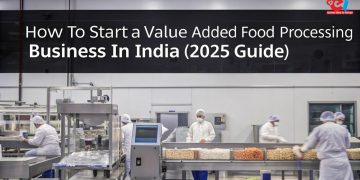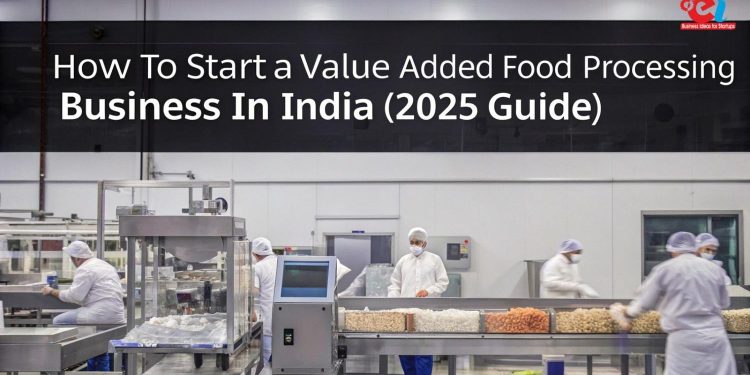The Indian food industry is standing on the threshold of a significant transformation. With shifting consumer preferences, technological advancements, and increased government backing, the traditional model of selling raw agricultural produce is being steadily replaced by the more profitable and sustainable model of value-added food processing.
Whether it’s turning milk into paneer and ghee or converting surplus tomatoes into ketchup and puree, the potential for growth is massive. For entrepreneurs, startups, and MSMEs, the food processing business represents a long-term and rewarding opportunity.
What is Value-Added Food Processing?
Value-added food processing refers to modifying raw food products in ways that enhance their value, either through taste, shelf life, packaging, or nutritional content. The industry not only opens up avenues for economic growth but also strengthens food security, reduces post-harvest losses, supports rural employment, and contributes to India’s export earnings.
The Shift Toward Processed and Packaged Foods
India’s growing middle class, urbanization, rising disposable incomes, and fast-paced lifestyles are driving people to seek convenience without compromising on quality. Ready-to-cook, ready-to-eat, and pre-packaged food products are seeing unprecedented demand.
Moreover, awareness around health, nutrition, and clean eating is pushing the food processing sector to innovate with fortified, organic, and low-preservative options.
This shift is not limited to big cities. Even Tier II and Tier III cities are experiencing a rise in supermarkets, food delivery apps, and online grocery platforms—further widening the market for processed food products.
Interestingly, consumers are not just looking for Westernized products. There is a massive resurgence in traditional Indian items like millet-based snacks, pickles, ayurvedic drinks, and regional spice mixes, which offer excellent business opportunities with cultural appeal and export potential.
Identifying the Right Food Processing Business
One of the most critical steps in establishing a food processing business is selecting a product or category that aligns with market demand, local resource availability, and the entrepreneur’s capacity.
While many segments are promising, choosing the right one involves strategic evaluation.
A startup in western India might focus on mango pulp, while one in the north could capitalize on wheat-based bakery products. A South Indian unit might find success in banana chips or dosa batter, whereas someone near fishing hubs may venture into seafood processing.
The choice should depend not only on raw material accessibility but also on perishability, competition, and supply chain considerations.
NIIR Project Consultancy Services (NPCS) offers comprehensive guidance on choosing the right food processing niche based on regional advantages, emerging consumer trends, and existing gaps in the market.
Related: Desiccated Coconut: Key Ingredient in the Food Processing Industry

Setting Up Your Processing Unit: Infrastructure and Operations
The setup of a food processing unit must reflect functionality, hygiene, compliance, and efficiency. The location must be close to raw material sources to reduce logistics costs and ensure freshness. It should also have access to basic infrastructure like water, electricity, waste disposal systems, and road connectivity for product distribution.
A well-planned food unit includes designated areas for raw material intake, washing, grading, processing, packaging, quality control, and storage.
Whether you’re producing dried fruits, flavored yogurt, or ready-made curries, each product type has specific equipment requirements. For example:
- A dehydration unit will need slicing machines, tray dryers, and vacuum packaging units
- A juice plant may need pulpers, homogenizers, sterilizers, and PET bottle filling machines
Automation is recommended even in small setups to reduce labor costs and improve consistency. Storage facilities must be planned based on the temperature and humidity needs of the products. Cold chains are essential for dairy, frozen food, and fresh-cut vegetables.
NPCS supports entrepreneurs with plant layout designs, equipment specifications, utility planning, and optimized production workflows that meet both domestic and international food safety standards.
Licensing, Certification, and Compliance
Food is a sensitive commodity, and its processing and sale are regulated under strict legal and safety frameworks. Every food business in India, regardless of size, must obtain an FSSAI license from the Food Safety and Standards Authority of India. The type of license (Basic, State, or Central) depends on the size and turnover of the business.
Other compliances include:
- GST registration
- Trade licenses
- Factory registration (if applicable)
- Pollution control certificates
- Quality certifications (ISO 22000, HACCP, AGMARK, BIS)
Export-focused units also need an Import Export Code (IEC) and may benefit from certifications like Halal, Kosher, or Organic depending on the target market.
Labeling is another critical area. Indian regulations require all packaged food to carry:
- Nutritional labels
- Ingredient lists
- Manufacturing and expiry dates
- Allergen warnings
- FSSAI license numbers
NPCS provides expert support in fulfilling all licensing and regulatory obligations, including documentation, application assistance, internal audits, and guidance on product labeling as per FSSAI norms.
Related: Top 10 High-Demand business ideas for Indian Entrepreneurs in 2025
Financial Viability and Investment Planning
One of the most attractive aspects of the food processing business is its flexible entry point. You can start small with a ₹10–20 lakh investment and scale as the market grows.
For instance:
- Starting a pickle, spice mix, or herbal juice business can require relatively low capital
- Medium-scale operations involving snacks, dairy, or beverage production may require ₹50 lakh to ₹2 crores
- Export-oriented or multi-product facilities may need over ₹5 crores
The profitability of the food processing business depends on:
- Product pricing
- Scale of production
- Procurement efficiency
- Brand visibility
- Wastage control
Gross margins in processed food can range from 20% to 50% depending on the product. Break-even is usually achieved within 2 to 3 years for most mid-sized units.
NPCS delivers bankable Detailed Project Reports (DPRs) with in-depth financial modeling, including:
- Capital cost breakdowns
- Working capital estimates
- Cash flow analysis
- Internal rate of return (IRR)
- Payback period
Sales, Marketing, and Brand Positioning
Even the most well-crafted food product will struggle without effective marketing and distribution. The Indian food landscape is crowded with players across categories, making it essential to position your product in a way that stands out.
Whether your unique value lies in:
- Regional authenticity
- Health benefits
- Affordability
- Taste innovation
Your branding must communicate that clearly.
Packaging plays a key role in attracting customers, especially for impulse buys like snacks, energy bars, or sauces.
Storytelling around sustainability, ethical sourcing, or traditional recipes also builds emotional connection with customers.
Many food businesses are achieving phenomenal growth via:
- Direct-to-consumer (D2C) channels using websites, social media, and influencer collaborations
- Offline distribution through general trade, modern retail chains, gourmet stores, and wholesale dealers
- Export channels via trade fairs, distributors, and global e-commerce platforms
NPCS not only offers go-to-market advisory, but also helps you prepare:
- Brand launch plans
- Pricing strategies
- Packaging concepts
- Market research to identify key demand centers across India and abroad
The Role of NIIR Project Consultancy Services (NPCS)
When you’re navigating a competitive, capital-intensive, and regulated space like food processing, expert support makes a world of difference. NIIR Project Consultancy Services (NPCS) has over four decades of experience in preparing high-quality, customized project reports for food and agro-based industries.
Their consultancy offerings cover:
- Identification of viable product ideas based on market trends
- Region-specific project feasibility studies and technical reports
- Equipment procurement guidance and plant layout development
- Licensing, branding, packaging, and export strategy consulting
- Assistance in availing government schemes, MSME subsidies, and bank loans
- Financial planning including break-even and ROI analysis
Whether you’re setting up a dehydration unit in Madhya Pradesh, a millet processing plant in Karnataka, or a spice grinding business in Kerala, NPCS helps convert your idea into a structured business model with clarity and confidence.
Conclusion: A Tasty Business Opportunity Awaits
India’s value-added food processing sector is more than just a business opportunity—it’s a pathway to national growth, farmer empowerment, and global influence.
As consumers continue to seek convenience, health, and authenticity, food entrepreneurs who act today can capture lifelong customers tomorrow.
Starting a food processing business requires vision, planning, and precision. With support from NIIR Project Consultancy Services, you can build a brand that doesn’t just feed customers—but builds a legacy in India’s booming agri-food economy.
If you’re ready to turn your kitchen idea into a market-ready product, or your raw produce into a shelf-stable brand—NPCS is here to help you cook up success.


















